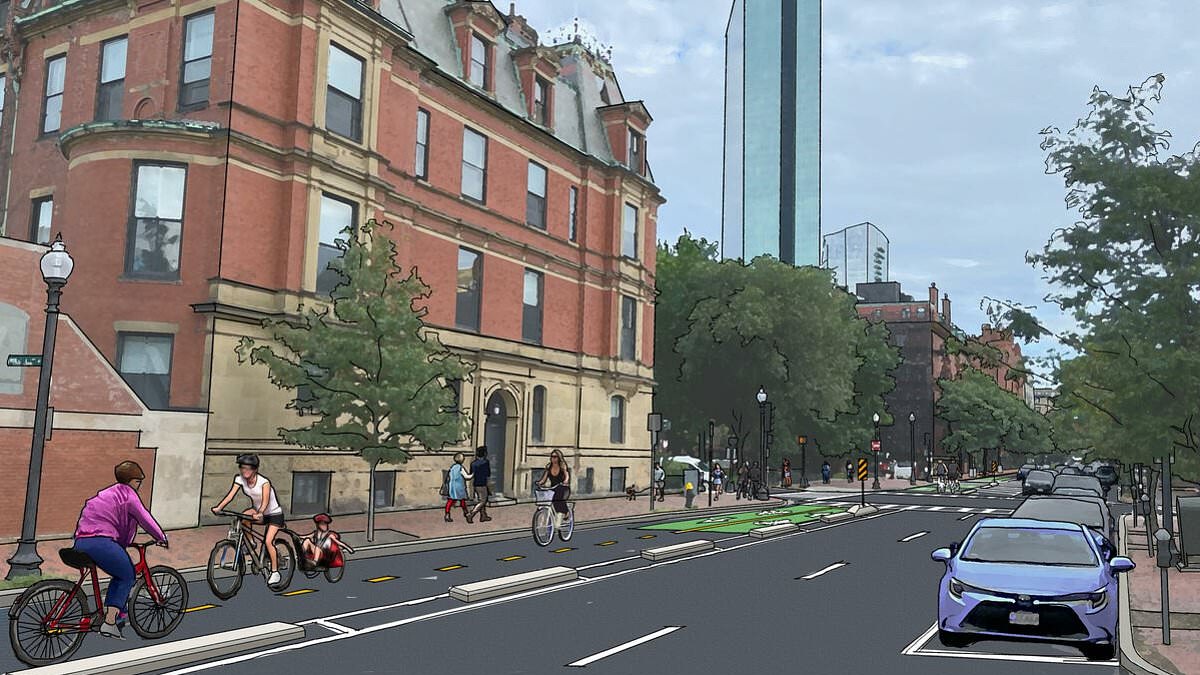A construction mogul who was once an ardent supporter of Boston’s woke mayor has turned against her after the city built a bike lane right outside his mansion.
Jay Cashman, 72, poured millions into Mayor Michelle Wu’s election in 2021, but became outraged when the new two-lane bike path was erected outside his $19 million mansion on Dartmouth Street last year, according to the Boston Globe.
It was just part of Wu’s plans to build an an elaborate cycling network around the city, as she doubled the number of dedicated bike lanes in Boston since she took office to 15 miles.
Her administration had identified Dartmouth Street ‘as a bike corridor project’ because it provides direct access to the Charles River Esplanade, which city officials called a ‘daily destination for residents, commuters and visitors alike.’
But Cashman has argued that these new bike lanes were hastily built and ignored critics’ concerns, which ranged from safety risks, loss of parking spaces, more congested street traffic and slower response times for emergency vehicles.
‘I’m for bike lanes, but I’m for bike lanes that basically are safe,’ he told the Globe as he cycled through the city himself.
The mogul is now using his wealth and resources to fight the mayor’s plans to expand the bike network even further.
He founded an advocacy group called Pedal Safe Boston and is convening neighborhood groups and meeting with lawmakers about legislative fixes to create bike lane standards.
The millionaire has also spent a whopping $100,000 to evaluate whether a statewide ballot measure to regulate bike lanes would be a more effective way to make city streets safer.
He is even backing a plan for city officials to consider removing or altering the bike lanes Wu’s administration created and set new rules for them moving forward.
Until then, Cashman argues, any construction on new bike lanes should be paused.
The proposal is being backed by Democrat mayoral challenger Josh Kraft – the son of New England Patriots owner Robert Kraft.
‘We really need to take the time to study how they impact business and figure out where to put them,’ he explained to Bloomberg.
Kraft has seized on the issue of Wu’s bike lane rollout as an example of how the mayor does not listen to criticism and is out of touch with the business community.
s and text messages from a super PAC endorsing Kraft have called the bike lanes a ‘disaster’ and proof that Wu’s plans ‘only make things worse’ for the city.
The messaging seems to resonate with at least some voters, as a February poll from Emerson College found nearly half of all registered Boston voters think the city has too many bike lanes.
Another 35 percent said they believed the city has enough bike lanes and just 17 percent said there were too few.
But cycling enthusiasts are wary of Cashman’s motives.
Someone even set up a website with his organization’s name, describing it as a ‘scam.’
They say creating more bike lanes makes cyclists safer and are frustrated that Cashman has not worked with them to come up with a solution.
‘I would just wish that Pedal Safe Boston would engage in the conversations already taking place as opposed to throwing stones from the outside,’ said Galen Mook, executive director of MassBike – a nonprofit that advocates for improving bike infrastructure.
‘There’s a little bit of privilege with the Pedal Safe Boston team because they have influence and money,’ he continued. ‘They haven’t actually gone through the literal decades’ worth of work of how the city has been putting down bike lanes.’
The Wu administration has also defended the bike lanes she put up and is continuing to advocate for even more bike lanes, with nearly two miles planned in Cashman’s neighborhood in the next few years.
She claims the bike lanes make roads safer, pointing to city data showing that crashes have declined by 51 percent on streets where bikers and drivers are separated by posts or other barriers.
Advocates also argue that bike lanes can boost store traffic as cyclists take breaks.
At a business forum in June, Wu likened the city’s new bike lanes to a family rearranging furniture.
‘Once you move it around, it’s always going to feel very weird because you are so used to how it was before,’ she said. ‘Sometimes, you need to live in it a little bit to see if that actually works.’
City officials have also noted that they held more than 50 public meetings on roadway projects last year, and amid the criticism, the Wu administration has taken down some flex posts – plastic bollards that act more as a visual cue than a physical barrier to protect bikers.
David Wean, a member of the Boston Cyclists Union, also acknowledged that there are some issues – like when a lane abruptly ends and bikers are forced into the middle of car traffic.
Still, he argues that much of the new infrastructure has made the streets safer as he railed against Cashman’s plans for a pause.
‘Insisting on absolutely complete, rigorous data is just a way of stalling it,’ Wean said.
Business owners, though, seem to be taking Cashman and Kraft’s side in the debate.
Meg Mainzer-Cohen, the president and executive director of the Back Bay Association, for example, claims the once business-friendly neighborhood has become a hazard for storefronts and delivery trucks.
Bike lanes ‘basically drove a stake into the functionality of the whole neighborhood.’
In the Brighton neighborhood, business owner Richie Singh said he also saw his revenue decline 40 percent year-over-year after the bike lanes went up late last year.
Some of his best customers were slapped with $100 parking tickets for blocking bike lanes. Worst of all, he said, he only sees two or three cyclists utilizing the new lane each day.
